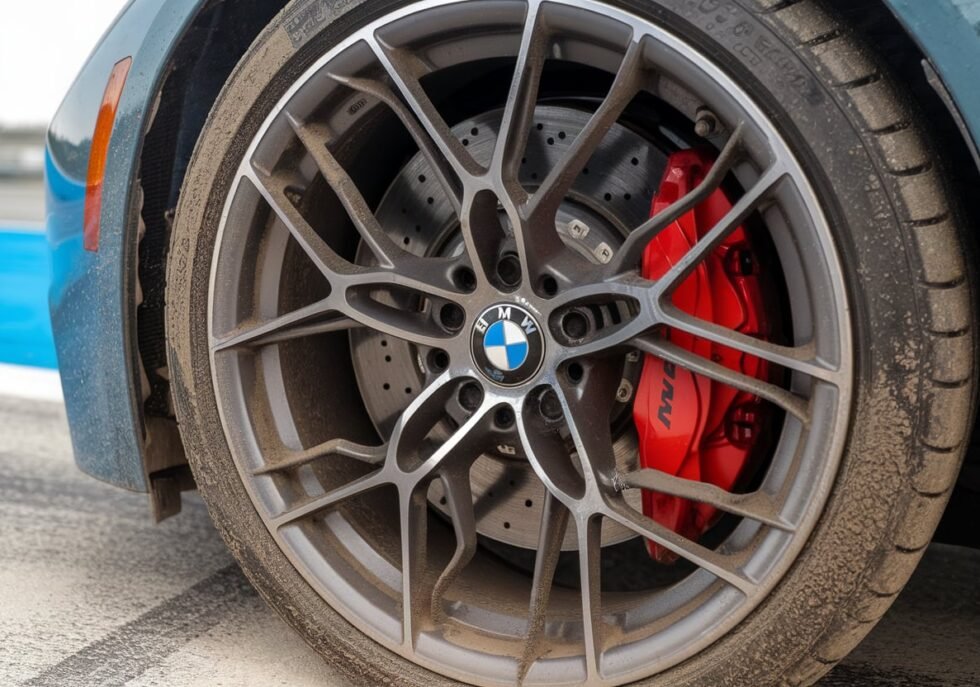
BMW Brake Fluid & Brake System Care Guide for Dubai
Ever had that terrifying second when your car does not stop as fast as you expected? Not the kind where your foot slips, the kind where you press hard and still feel a delay? In Dubai, that second can happen often. Not because of worn-out pads or faulty sensors. But because your brake system silently gave up… through BMW brake fluid that has thinned, boiled, or absorbed too much moisture to function right.
Imagine that moment on a highway. Traffic comes to a halt. You react. The brakes? Do not. It sounds dramatic, but it happens, and usually when no one expects it. This guide walks you through the exact reasons German cars suffer in Dubai’s stop-go heat, and why BMW brake fluid is not something you can afford to forget.
What Makes the BMW Brake System So Unique (and So Sensitive?)
Ever wondered why your BMW feels different the moment you tap the brakes? Not just responsive, precise. Like the car listens to you in milliseconds. That is not a coincidence. It is engineering. But here is the catch: that level of precision comes with zero tolerance for weakness. BMW’s brake system is not just built to stop the car. It is designed to translate pressure into performance. Every time you touch the pedal, a chain reaction begins. The brake booster amplifies your force, the master cylinder sends fluid through narrow brake lines, calipers clamp with timed force, and rotors spin to a halt. But if even one of those steps stumbles? The whole system loses its rhythm.
Insight: BMW’s brake master cylinder and caliper system require a very specific fluid viscosity to maintain pressure under load. That is why fluid condition is not just important , it is critical.
Let’s not forget the ABS module. That computer-controlled brain checks your wheel speed, your foot pressure, even road grip, and balances all that in milliseconds. But it can only work if the brake system is stable and the fluid inside it can respond without delay. You do not get sports-grade handling without sports-level sensitivity. Which is why even slightly degraded BMW brake fluid can cause real-world issues long before any warning light shows up.
Why BMW Brake Fluid Fails Faster in Dubai?
Let us be honest, Dubai is brutal on cars. Forget about engine oil or tyres for a second. The brake fluid in your BMW? It suffers quietly, without any obvious signs… until it is too late. Why?
Because unlike other car fluids, BMW brake fluid is hygroscopic; it pulls moisture right out of the air. And in Dubai, air is full of it. Combine that with 45°C traffic jams, constant braking, and sand flying into every crevice? You have got a perfect storm. Brake fluid is supposed to stay firm under pressure, even when heated. But once it absorbs enough moisture, its boiling point crashes, similar to how engine fluids lose strength in high temperatures. Our BMW engine care tips for UAE high temperatures explain how desert heat quietly weakens your car’s internal systems long before visible damage begins.
That means vapor bubbles, spongy pedals, and worst-case… brake failure. In Dubai, what lasts 2 years in Europe barely makes it through one summer.
We have seen DOT 4 brake fluid look clean to the eye, and yet fail under load. That is how sneaky it is. One moment your brakes feel strong, and the next, they feel numb. And let us not forget the sand. That fine, sharp grit works its way into connections and seals, slowly contaminating the brake system. Not dramatic, just deadly quiet.
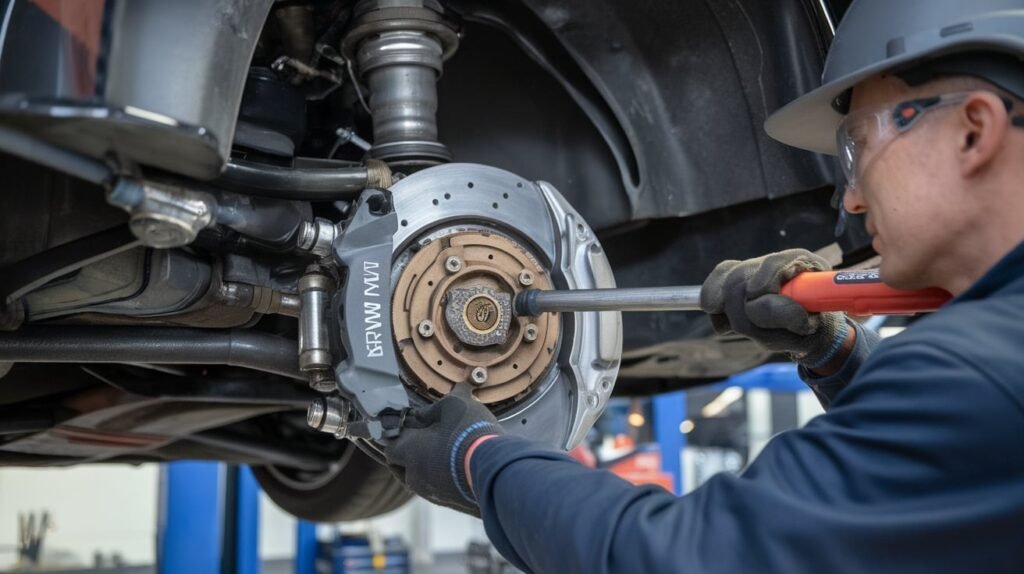
What Happens When You Ignore Your BMW Brake System?
It always starts small. A softer pedal, a little extra force needed to stop, a minor delay that you explain away as traffic or heat. But what you are really feeling is your brake system quietly slipping out of sync. We have seen this far too often. A BMW rolls into the garage with a complaint about brake noise , and what we find is a chain of failures that started months ago… with neglected brake fluid. Here is what typically happens when service is delayed:
- Spongy pedal response
Fluid contaminated with moisture starts to vaporize under heat, creating bubbles that reduce brake pressure. - ABS malfunction
Dirty or degraded fluid can confuse the sensors, leading to warning lights or poor traction control. - Rotor warping
Uneven pressure from the brake system can cause the rotors to overheat and lose shape , especially on long downhill drives. - Increased stopping distance
The fade creeps in. You do not notice it at first, until that one hard stop that almost does not happen. - More expensive repairs
The longer fluid sits without change, the more it corrodes internal components like calipers and master cylinders.
It is not just about stopping slower , it is about creating a domino effect of avoidable damage.
How Often Should You Replace BMW Brake Fluid in Dubai?
There is a common belief , change your brake fluid every 2 years. Sounds neat, simple, and backed by the handbook. But here is the problem… That rule was not written for Dubai. In this climate? That 2-year mark is often way too late. We have seen BMWs with fluid boiling at low temps after just 12 months. Daily city driving, heavy braking in peak heat, and even long idling at traffic signals cook the fluid slowly, every single day. Here is what we suggest for BMWs in Dubai:
- Replace BMW brake fluid every 12–18 months, especially if mileage is high or driving is aggressive.
- Check fluid health during every brake system inspection , not just on a schedule.
- Keep a simple maintenance log. You will thank yourself when the pedal stays firm and responsive in summer.
It is not just maintenance. It is prevention.
Understanding Brake Fluid Types | Which One Does BMW Actually Need?
Ask most drivers what brake fluid they are using, and the answer is usually… “uh, whatever the garage put in.” But with BMW brake fluid, that answer matters. A lot. Your BMW’s brake system was not designed for guesswork. It demands precision , and the wrong fluid type? It throws everything off. Pedal feel, ABS timing, brake balance , all of it. Here is what most people do not realize:
- DOT 3 is too weak. It has a lower boiling point and absorbs moisture faster. Not built for performance cars.
- DOT 5.1 sounds advanced, but it is silicon-based. It is not compatible with BMW rubber seals.
- DOT 4 / DOT 4+ is the gold standard. BMW recommends it because it balances high heat tolerance with low viscosity , perfect for those stop-go Dubai drives in 115°F heat.
BMW brake fluid may look clear, but its real performance is hidden in how it behaves under pressure and heat. Also , be careful with OEM-labeled fluids. Just because it says “DOT 4” does not mean it meets BMW’s actual spec. Some aftermarket fluids have the label, but not the heat resistance or moisture balance BMW engineers tested for. Always ask for original BMW brake fluid, not just something DOT-labeled off the shelf.
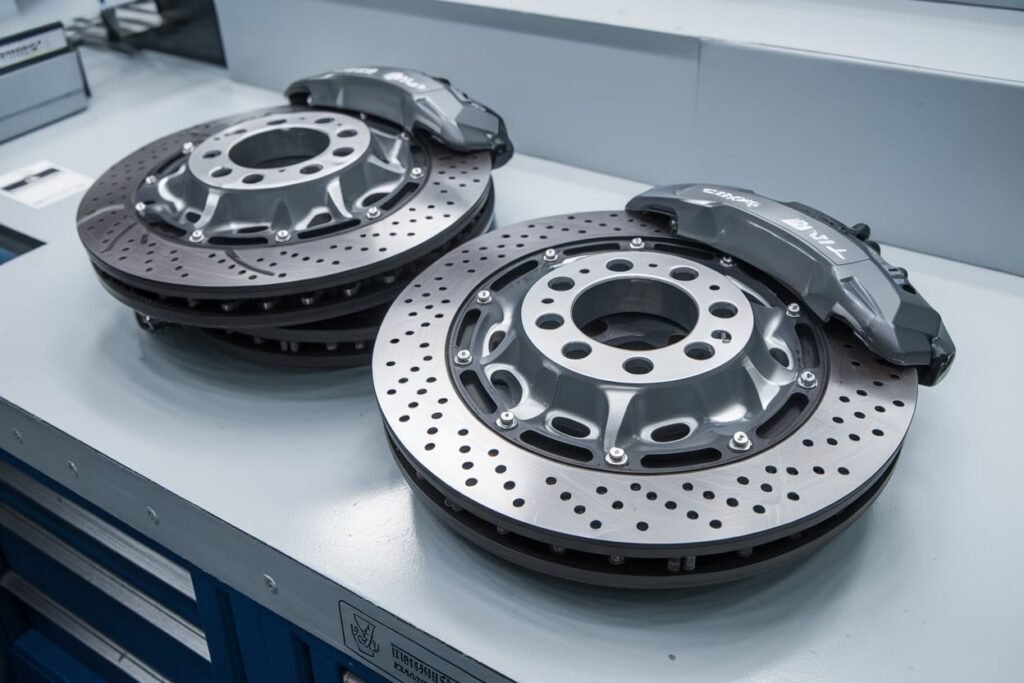
What to Expect from a BMW Brake Service Package in Dubai?
Not all brake services are built the same , and in Dubai, that difference can cost you more than just money. We have seen cases where drivers paid for a “full brake job,” only to find out their fluid was never touched. Or worse, the wrong type was used. That is why understanding what should be included in a BMW brake service is just as important as booking it. Here is what a proper package should look like:
- Brake system inspection
Full check of pads, rotors, hoses, and calipers , including wear levels and uneven heat marks. - BMW brake fluid replacement
Old fluid flushed out and replaced with the correct DOT 4 or 5.1 fluid. No topping-up, full change. - Rotor + pad evaluation
Micrometer measurements, surface condition check, and rotor run-out testing. - Seasonal fluid check-up
Boiling point test and moisture level analysis before peak summer and winter cycles.
If even one of those steps is skipped, your brake system may still be unsafe , even after a fresh invoice.
How Much Does BMW Brake System Maintenance Cost in Dubai?
Luxury car maintenance always comes with a little uncertainty , especially in Dubai, where prices vary between garages, parts, and how deep the problem goes. We have seen BMW owners overpay because they were unsure what a typical brake system job should cost. On the other hand, some went too cheap… and paid for it twice. So, what should you expect when it is time to deal with your BMW brake fluid or rotors? Here is a rough cost breakdown based on real garage averages in Dubai:
| Service Type | Estimation Cost (AED) |
|---|---|
| Brake fluid flush | Starting from 220 AED |
| Rotor and pad job (front or rear) | From 900–1400 AED |
| Multi-axle brake system overhaul | From 2000–3200 AED |
What to Look for in a BMW Brake Specialist in Dubai?
Anyone can say they fix brakes. But when it comes to your BMW brake system, you need more than someone with a wrench and a vague promise. We have seen drivers walk in after a “brake job” that used the wrong fluid or skipped a pressure test entirely. You cannot afford that with German engineering. Here is what to look for before handing over the keys:
- Scan tools made for BMW
Generic OBD devices miss critical codes from the ABS, DSC, and brake system modules. - Genuine parts — not just OEM-labeled
Original parts are made by the same manufacturers BMW uses. The cheaper OEM alternatives sold separately? Not the same. - Fluid-grade knowledge
A proper technician knows why BMW brake fluid must meet DOT 4+ specs , especially in Dubai heat. - Workshop hygiene & torque discipline
Brakes are about pressure. One wrong torque value, one dirty line , and the system bleeds air instead of stopping cleanly.
If the technician does not talk about fluid condition and brake pressure, walk away. Your safety deserves better.
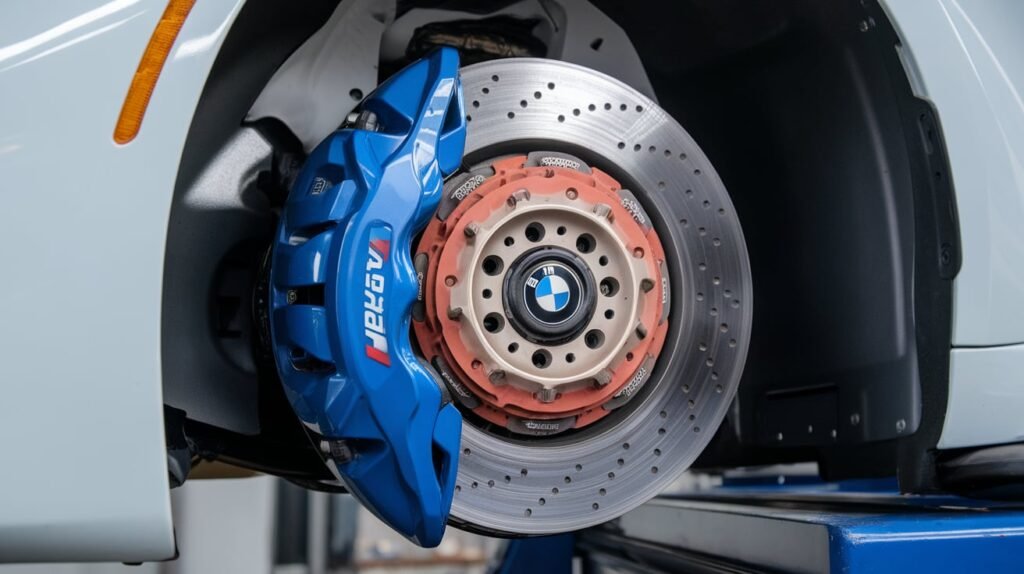
Practical Tips to Extend the Life of Your BMW Brake Fluid & Brake System
Start with a short intro: Even the best brake system cannot survive bad habits. In Dubai, a little mindfulness goes a long way , especially with your BMW brake fluid and braking setup constantly under stress. These are not DIY hacks , just smart ways to reduce wear and protect performance:
- Avoid riding the brakes in traffic: Light, frequent braking raises fluid temp and causes early breakdown.
- Do not ignore slight pedal changes: A softer feel? It is not in your head. Get the brake system checked right away.
- Request a brake fluid test during oil changes: Most garages can check moisture levels in 2 minutes.
- After desert drives, get a visual rotor check: Sand particles can warp rotors if trapped between pads.
- Use original fluids during top-ups, not random DOT 4: BMW requires specific viscosity and boiling point properties.
- Space out aggressive braking: Let your brakes cool after hard stops or long hill descents.
These small habits make a massive difference. Brake care is not just about reacting to failures , it is about staying ahead of them.
Seasonal Brake System Behavior in Dubai
In most places, seasons affect your wardrobe. In Dubai? They affect your brake system. We have serviced countless BMWs that came in with braking complaints , and often, the issues matched the weather. No joke. When it gets hotter, BMW brake fluid thins out. When winter rolls in, dust builds up in places it should not. Your brakes might not care about temperature, but your fluid does. Seasonal changes affect more than brakes, even cabin performance shifts with temperature swings. Check our BMW cabin air quality guide to see how dust and humidity also affect interior airflow and air filters during Dubai’s extreme months.Here is how Dubai’s climate impacts your BMW across the year:
- Summer (45°C and up)
Brake fluid heats up quickly in traffic. The boiling point drops if there is moisture inside. That means pedal fade, slower pressure build, and increased stopping distance. - Winter (milder temps, higher dust)
Pads and rotors attract fine desert dust, which leads to glazing , a shiny surface that reduces bite. Brakes may feel solid, but stopping gets weaker. - Humidity spikes (usually post-rainfall)
Even short-term humidity affects BMW brake fluid, which is hygroscopic. Water content goes up, and boiling point goes down. - City vs. highway driving
Stop-go city driving raises fluid temps faster than highway cruising. Your brake system endures more stress in bumper-to-bumper traffic than in high-speed motion.
Knowing how your BMW responds to the weather means fewer surprises , and a lot more control behind the wheel.
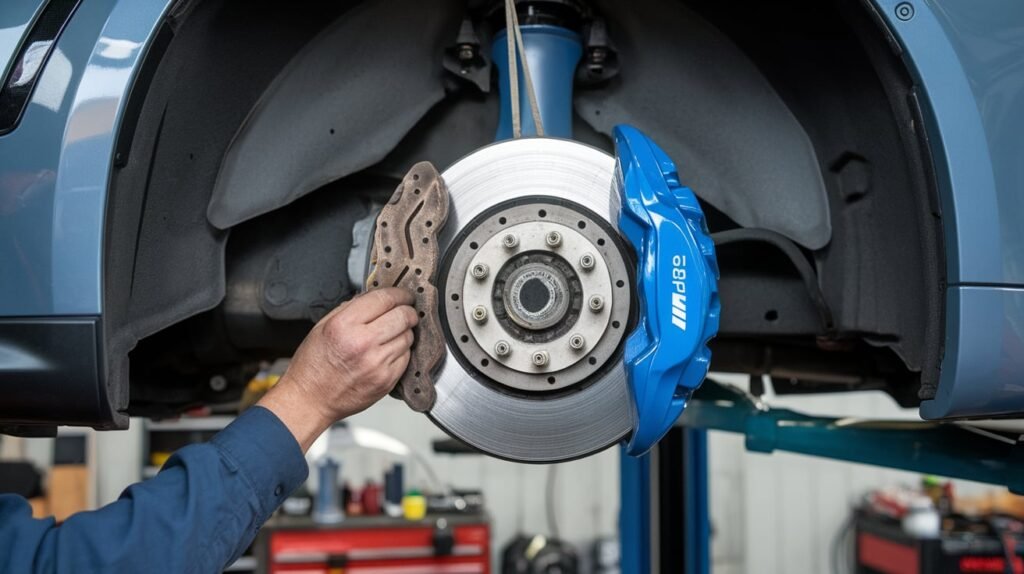
Post-Service Checks | How to Tell If Your BMW Brake System Was Serviced Properly
You paid for a full brake job. The invoice looked good. But did they actually do the work? We have had BMW drivers show up days after a “service” with the same soft pedal or brake warning light still flashing. The problem? Corners were cut. Either the BMW brake fluid was only topped up , not flushed, or the brake system was never pressure tested at all. You cannot always see what was done, but you can feel it if you know what to look for. Here is how to spot a proper brake service:
- Pedal feel improves immediately
After fluid flush and bleed, the pedal should feel firm and consistent , not vague or soft. - No ABS or DSC warning lights
A proper scan clears brake-related errors. If the light returns, something was missed. - Bite is sharper during early stops
If your BMW had new pads or rotors, you will feel a slightly stronger brake response during initial drives. - Service report shows brake fluid type and pressure test results
Always ask what fluid was used. DOT 4+ is typical for BMW. If they cannot answer, that is a red flag.
If your brakes still feel “off,” trust your instincts. Something might have been left undone , and in a car like a BMW, that is not something you gamble on. Book your next BMW brake inspection in Dubai with our expert team or visit the BMW Garage Dubai service center for complete diagnostics, fluid testing, and road-ready performance checks designed for UAE driving conditions.
Braking Power Is Not Optional
It only takes one moment , one red light, one distracted driver, one slippery turn, for your brake system to be tested. And if your BMW brake fluid fails at that moment? Everything else becomes irrelevant. This is not about maintenance. It is about control, confidence, and staying alive on Dubai’s roads. You can delay a service, but you cannot delay a stop.

